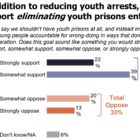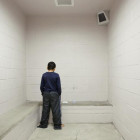
Californians Lean Toward Eliminating Youth Prisons in New Survey
|
California’s juvenile prisons have long had a poor reputation as mere stops on the way to grown-up prisons, overcrowded places where reform or rehabilitation were rarely achieved.
Juvenile Justice Information Exchange (https://jjie.org/tag/juvenile-law-center/page/2/)

California’s juvenile prisons have long had a poor reputation as mere stops on the way to grown-up prisons, overcrowded places where reform or rehabilitation were rarely achieved.

Solitary confinement in juvenile facilities remains too widespread, is unnecessary and counterproductive, is unfairly applied and is harmful, a new report says.

Pennsylvania’s General Assembly last week, on the last day of its session, voted to end the automatic life without parole for teens convicted of first- or second-degree murder. But some advocates say the new scheme misses the point of real reform. Senate Bill 850 sets the minimum sentence for first-degree murders committed by 15- to 17-year-olds at 35 years. For younger teens, it’s 25 years. New second-degree murder minimum sentences would be broken up in the same tiers: 30 years for older teens; 20 for younger ones.

I joined the Army in 1984, at least in part because I hated high school. I couldn’t stand the drudgery of boring classes, which, at least to my adolescent mind, were a big waste of my time. Even though my parents encouraged me to attend college, I was having none of it. My idea of what school looked like was pretty entrenched, and it took going to prison to get me back in the classroom. At the time, 1986, I had been in for not quite a year, and a lot of people told me that going to college would look good to the parole board.